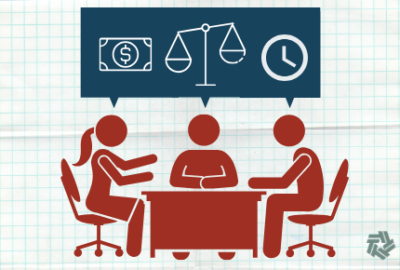Meet the federal senior executive of the year
Michal Rottman, from the Transportation Security Administration, was named this year's senior executive of the year.
Each year, the Senior Executives Association highlights some of the top members. This year, the senior executive of the year has been named. Michal Rottman is the assistant administration for domestic aviation operations at the Transportation Security Administration. She joined the Federal Drive with Tom Temin to discuss.
Interview transcript:
Tom Temin: So you’ve got a pretty big portfolio. Every domestic airport that has a TSO, a transportation security officer. That’s kind of your purview?
Michal Rottman: Yes. I really am privileged to be the advocate for operational personnel out there across 430 airports. Our uniform workforce, which I think most people are familiar with, but also the men and women who support our regulatory inspections and some of our more specialized operational and staff positions.
Tom Temin: All right. And this is a job you’ve had, I mean, you’ve been at TSA for some time and you have had this job for a couple of years. What did you do that got you executive of the year from the SCA?
Michal Rottman: Well, I really feel just so glad to be able to have that representation not only of my team and domestic aviation operations, but for all of the women and men at TSA who support our day-to-day mission and the people of our workforce. I did start with TSA in the very beginning. In fact, I took my oath of office as a federal aviation civil aviation security specialist on Sept. 10, 2001. So I’ve really watched TSA grow from its very infancy to now and have felt privileged to be a part of that. I’ve been in this role for two years and really have worked to focus on our core mission of detection while ensuring that our customer service is improved and we’re engaged with the community out there to ensure the security of millions of passengers each and every year.
Tom Temin: And if I heard you right, you signed your oath or you took your oath of office the day before 9/11?
Michal Rottman: I did. And that’s really galvanized my commitment to the mission and people of this organization in a very real way. So I bring that with me to the office each and every day and make sure that we’re focused on developing programs or policies and focused on our workforce, that we’re really coming from a place of mission focus and taking care of our people and learning from that event so that we carry those lessons with us forward and our day-to-day work.
Tom Temin: And one of the characteristics, I think, of the screening process, which is where most Americans encounter TSA, has been the technological development such that it’s a far less crabby kind of experience than it was in the beginning. And would you say that’s been part of the, I guess, change that you’ve seen in the years of TSA? It went from an emergency measure to something really painfully arcane and crowding to now, for millions of people, it’s pretty smooth.
Michal Rottman: Yes. And we certainly have advanced over these last 22 years with our technology system. So many of the passengers out there are probably now familiar with our advanced boutique machines that allow them to keep their laptops in their bags and really have made strides in making sure that our process is as seamless as it can be. We’ve also put a lot of focus on our customer engagement, both with our workforce and as it relates to the technology and the interaction that the passenger has with that process. So I feel like we have come a long way in that respect and are still looking at what we could do to make that process even smoother. For example, working on touchless identity solutions to make the processing of identity faster. So there’s more coming, but we have come a long way since our early days in TSA.
Tom Temin: We’re speaking with Michal Rottman. She’s assistant administrator for domestic aviation operations at the Transportation Security Administration and senior executive of the year from the Senior Executives Association. And that last point you mentioned, there is a lot of I guess you might call it, for lack of a better word, psychological development that the staff has had in dealing with the public. It’s like TSOs have gotten nicer and flight attendants have gotten tougher.
Michal Rottman: So we certainly really do focus on the customer service aspect of what we do. We feel it’s really important that passengers be a part of the security process and that they understand our requirements and are engaged with our personnel as they move through that process. So we have focused a lot on that. We do customer service surveys, have trust engagement with the traveling public, and I was very pleased recently to see a 94% trust from the traveling public during those surveys and very high customer service results. So it’s an area of focus for us that we continue to work on. And you’re going to see more coming from us here in the months ahead on that.
Tom Temin: And in your job, it’s an office job. You’re administrating a huge, what, almost 50,000 officers across the country, plus all of these hundreds of technological installations. Do you ever get a chance to get into an airport terminal and kind of check it out in person?
Michal Rottman: Absolutely. I have the privilege of traveling around the country a lot and visiting many of our airports, both the larger locations, but also our smaller airports out there that don’t necessarily get a lot of attention. And as an advocate for the men and women of TSA, it is my role and responsibility to be out there and engaging with them and listening to them. So I understand how to be the best advocate I can for them as they are out there executing on a mission every day.
Tom Temin: And what are the next top priorities for TSA?
Michal Rottman: Yeah. So I think continuing to advance our technology systems out there and deploy the systems that we know are going to improve the customer experience and increase security, as well as continuing to engage on the customer service aspects of what we do and advance our capabilities in the security area of the missions that we have. Also looking for ways to take care of our team members and make sure that they are equipped and ready to perform their important mission.
Tom Temin: You think the whole thing could be streamlined if people didn’t carry so much crap on the plane with them?
Michal Rottman: Well, certainly.
Tom Temin: That’s the technical word for it.
Michal Rottman: Yes. Clutter bags do present additional challenges in terms of the time that it’s going to take for somebody to really review that image. And so what I would encourage people to do is always start with an empty bag and pack from there and try to really pack smartly and think about it as you go through the process. Certainly, the less image interpretation our officers are doing, the faster that line will move.
Tom Temin: Sure. And of course, the volumes have returned to air flight since before the pandemic. And would you say that operationally, you are ahead of the game relative to before the pandemic?
Michal Rottman: Yeah, I have to say, I’m so proud of the team with the airport and airline community. And we have seen the aviation industry really come back since the COVID pandemic. We had 47 of our top 100 busiest days ever just during the summer period. We set all top 10 records in about a six-week period this summer, and we expect another three million day this Sunday after Thanksgiving. So the volume has come back. The industry is definitely strong and we work collaboratively both on the local level and at the national level to ensure that we are ready and prepare peak travel periods. And I’m confident in our teams out there. They’re certainly ready to support safe travel over the Thanksgiving period.
Tom Temin: And by the way, what is the interaction that TSA has with carriers as opposed to the officers and the flyers, the passengers?
Michal Rottman: Yeah. So we have a very close working relationship with the carrier community. So we talk with the airline community on a regular basis on the operations. Specifically and locally, the federal security directors and their teams are engaged directly with the station managers so that they’re aware of what the planning is on the airline side. That is a very healthy relationship and we’re grateful to our partners in the aviation industry for their partnership as we tackle this long and that we’re seeing them at this point.
Tom Temin: And your friends and neighbors that know what you do, do you get inundated with suggestions?
Michal Rottman: Even from my parents, you would be surprised. So, yeah, I mean, certainly, those are good opportunities to learn. Having that candid feedback is important so that we understand what the passenger experience is and that we can be responsive to that. But I’m really proud of our teams out there. They do an amazing job under some tremendous pressure. And I just ask those who are listening today as you’re traveling through the holiday season, make sure to thank our officers out there. They really do work hard and show up on all of the times. And we’re getting to stay home with our families. They’re out there working so that we can spend that time together.
Tom Temin: Just don’t try to bring a quart of eggnog aboard, that’s all.
Michal Rottman: Yeah, that’s right. Make sure you read all the requirements on our prohibited items list before you show up at the airport so that you’re able to get through that process seamlessly.
Copyright © 2025 Federal News Network. All rights reserved. This website is not intended for users located within the European Economic Area.
Tom Temin is host of the Federal Drive and has been providing insight on federal technology and management issues for more than 30 years.
Follow @tteminWFED






